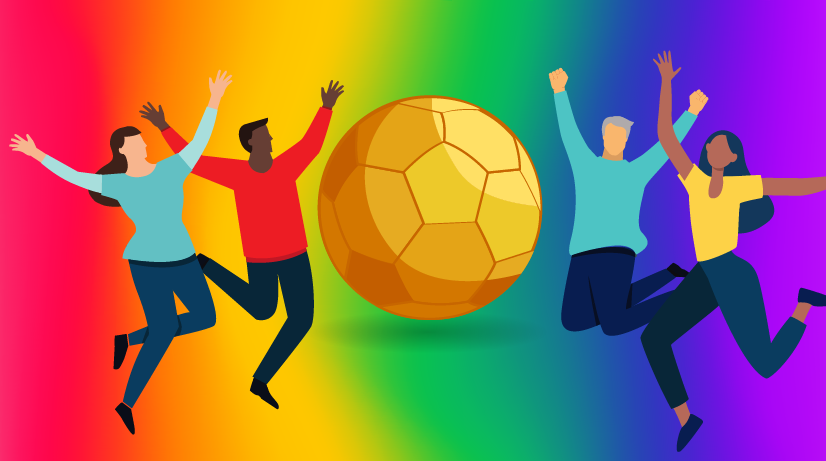This newsletter is unlike the previous ones that you’ve received from us – but we hope that you’ll see why we wanted to do something different this time.
This World Cup was always going to be controversial. From the moment it was announced that the host country would be Qatar, concerns were raised about the environmental impact of staging football matches in 50°C heat and many governments and human rights organisations expressed alarm at reports about working conditions and safety records during the construction process.
But since the tournament kicked off another issue has come to the fore, as the organisers have made it clear that any visible support for LGBTQ+ rights would be banned. Harry Kane was forced into a well publicised U-turn over his decision to wear a OneLove armband during the games having been subjected to what was described by one official as “extreme blackmail.” A Danish TV presenter was also rapped by police live on air for wearing the armband, while football officials even tried to seize the national flag of Brazil from fans, believing it to be a rainbow flag.
Trashing LGBTQ+ hats – and rights
In another incident, Laura McAllister, a gay woman, and former FIFA Council candidate, was one of a number of Wales fans who were told to remove an LGBTQ+ Rainbow Wall hat for their country’s game against the USA. According to reports the hats were thrown in a bin.
Perhaps the wittiest protest came from comedian Joe Lycett who asked David Beckham to renounce his ambassadorship of the World Cup and threatened to shred £10,000 if the footballer refused. Beckham didn’t respond and Lycett has since donated the cash to LGBTQ+ charities.
Another protest was staged by Iranian fans in support of women who have been demonstrating following the death of 20-year-old Mahsa Amini at the hands of Iran’s morality police and to demand that Iranian women have the right to decide whether to wear a head scarf or not.
Cultures and values vary across the globe, of course, but concerns about the way that rights of LGBTQ+ people have been dismissed and even attacked at the World Cup have prompted many companies to think about how deeply ingrained their Diversity, Equality and Inclusion (DEI) policies really are.
Living your values day to day
After all, putting up a rainbow flag in your reception or making speeches about promoting female talent is easy – living these ideals in everything you do, in daily interactions between teams, in conversations with managers and their line reports can be more of a challenge. Would you choose to work with a partner, for instance, who didn’t share your values, or would you compromise those values if it helped you to win a contract? This World Cup has demonstrated that your claim to believe in DEI can be tested when the rubber hits the road or, in this case, the boots hit the turf.
Extensive research shows that those companies with more diverse workforce and a culture that accepts people in all their differences are more likely to attract the best talent and to keep hold of them. Research from McKinsey & Co found that in 2019, companies in the top quartile of gender diversity among their executive teams were 25 per cent more likely to enjoy above-average profitability than peer companies in this fourth quartile. This figure was up from 21 per cent in 2017 and just 15 per cent in 2014.
Researchers from two Finnish institutions, Aalto University School of Business and the University of Vaasa, looked at the financial performance of just over 650 listed US companies between 2003 and 2016, and discovered that those with LGBTQ+ policies tend to enjoy both greater profitability and higher valuations on the stock market.
Diversity – an antidote to groupthink
We see from our own work with a wide range of companies across the world how diversity among teams is an important antidote to groupthink. Get a crowd of people around the table from different social backgrounds, ethnic groups and with sexual orientations and identities and you’re more likely to get a wider range of perspectives on an issue.
We also know from the many companies that we work with that when their diverse teams of people go out to meet clients or to pitch for business it helps if they reflect the diversity and variety of the organisations that they’re talking to.
One of our team, Simon Brooke, who specialises in communications and media training, volunteers for a charity called Diversity Role Models. “We go into schools to help challenge homophobic bullying and to get the kids to be more accepting of LGBTQ+ people,” he says. “It’s amazing how fascinated they are when they hear the story of an out, confident gay man or a transgender woman and to ask them questions about their lives and their experiences as a minority.”
From school to the world of work
“Some of the questions can be challenging – and some are quite funny, actually – but you know that because their kids, those questions are completely honest – there’s no filter. We go away after a day in school feeling exhausted but on an incredible high because we know that we’ve gone someway to helping the next generation to be more open-minded about people in all their differences – as well as helping those two or three kids in every class who might be LGBTQ+ to know that they’re not alone and that they’re valued by society. It’s good to think that these young people might have a more open minded attitude when they enter the world of work.”
Threshold’s strapline, as you might know, is “how to work with humans”, and perhaps we should add that this means all kinds of humans – different races, sexual identities, orientations and abilities. Where we train people to have honest, performance conversations, influencing and creating psychology safety. The essence of what we’re saying is that everyone is different but everyone is equal and we should all be respected for that difference. You don’t have to be a woman or to be LGBTQ+ or BAME or disabled for that matter to benefit from a working environment that really put the ideals of DEI into practice – and doing that makes life better for all of us.



